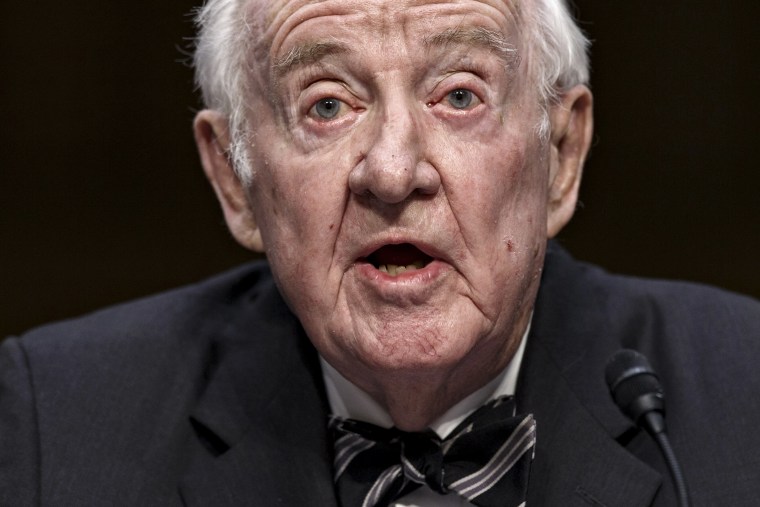Former Supreme Court Justice John Paul Stevens told senators Wednesday that the laws governing money in politics need a fundamental overhaul to ensure that the voices of voters aren’t drowned out by a flood of dollars from wealthy donors.
Appearing before the Senate Rules Committee, Stevens, a liberal who retired from the high court in 2010, took aim at several fundamental tenets of the courts’ approach to campaign finance laws: that stopping corruption is the only justification for campaign finance laws; that Congress has the right only to limit campaign donations, not campaign spending; and that money counts as speech.
Wednesday’s hearing, convened by Sen. Angus King, an Independent from Maine who sides with Democrats, was designed to look into the impact of the Supreme Court’s recent McCutcheon ruling, which struck down limits on total aggregate campaign contributions.
Chief Justice John Roberts’ ruling in the McCutcheon case rested in part on the premise, established in past cases including Citizens United in 2010, that campaign finance rules can only be justified if they’re narrowly tailored to stop outright corruption.
Stevens, 94 but still vigorous and sharp, called that stance “fundamentally wrong.”
“Creating a level playing field justifies regulating campaign speech,” Stevens argued, comparing campaign finance laws to the rules governing an athletic contest.
The goal, Stevens said, is to give candidates “an equal opportunity to persuade citizens to vote for them.”
But in what he called his most important point, Stevens challenged a far-reaching holding in a 1976 case, Buckley v. Valeo, which established that campaign finance laws can only regulate donations to campaigns, not spending by campaigns.
Stevens called this the “central error” in the Supreme Court’s jurisprudence on campaign finance issues. “Unlimited campaign expenditures impair the process of democratic self-government,” he said, “and create a risk that successful candidates will pay more attention to the interests of non-voters who provided them with money than to the interests of voters who elected them.”
He called for a constitutional amendment to fix the mistake, and laid out his preferred wording:
Neither the First Amendment nor any provision of this Constitution shall be construed to prohibit the Congress or any state from imposing reasonable limits on the amount of money that candidates for public office or their supporters may spend on their campaign for public office.
New York Democratic Sen. Chuck Schumer said at the hearing Wednesday that Democrats would hold a vote this year on an amendment from New Mexico Democratic Sen. Tom Udall that would overturn the Supreme Court’s recent campaign finance rulings, according to TPM.
Stevens also took on the favored conservative notion, central to Citizens United, that campaign money equals speech, so efforts to limit it must raise First Amendment problems.
“While money is used to finance speech, money is not speech,” Stevens reasoned. “Speech is only one of the activities that are financed by campaign contributions and expenditures. Those financial activities should not receive the same constitutional protection as speech itself.”
But the challenge facing Stevens and those who agree with him was clear after he stopped speaking. Texas Republican Sen. Ted Cruz praised Stevens as a smart and honest judge, but he argued that the main impact of campaign finance laws is to protect incumbents and limit political involvement among citizens.
